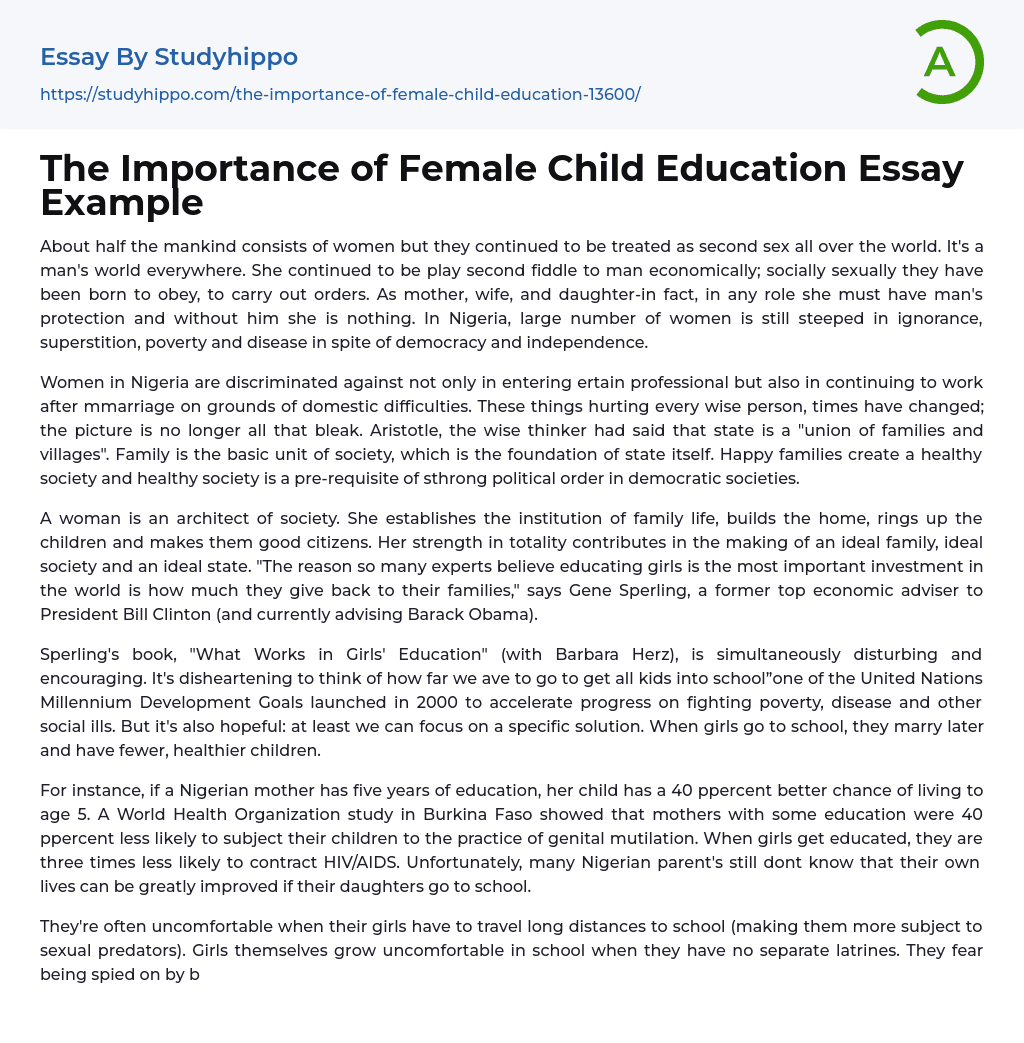
Despite comprising approximately half of the global population, women continue to face inequality in various aspects such as economics, social interactions, and sexuality. They are expected to be subservient and rely on men for protection and significance. This discrimination is even evident in Nigeria, a democratic country where many women still confront ignorance, superstition, poverty, and disease.
Discrimination against women occurs not only in specific professions but also when balancing work and domestic responsibilities after marriage. However, although these issues significantly impact individuals' lives today, the situation has improved compared to the past. Aristotle's belief that the state is a "union of families and villages" emphasizes the importance of family as the fundamental unit of society. In democratic societies, a healthy political order relies on happy families contributing to society.
="justify">Women play a crucial role in shaping society by establishing family life institutions and building homes. They raise children who become valuable citizens contributing positively to their communities. The strength of girls ultimately contributes to creating ideal families, societies, and states. According to Gene Sperling, a former top economic adviser to President Bill Clinton, experts widely acknowledge the significance of educating girls for their families.
In his book "What Works in Girls' Education" (co-authored with Barbara Herz), Sperling discusses both concerning and encouraging aspects related to the lack of access to education for all children, which is a key goal of the United Nations Millennium Development program. The disheartening reality is that many children do not have access to education. However, there is hope in focusing on a specific solution: sending girls to school. When girls attend school, they delay marriage and have fewer and
healthier children. For instance, if a Nigerian mother receives five years of education, her child's chance of survival until age five improves by 40 percent. A study conducted by the World Health Organization in Burkina Faso found that mothers with some education were 40 percent less likely to subject their children to genital mutilation. Furthermore, educated girls are three times less likely to contract HIV/AIDS.
Unfortunately, many Nigerian parents are unaware that their own lives could significantly improve if their daughters attend school. Parents often feel uneasy when their daughters have to travel long distances to school as it puts them at higher risk of encountering sexual predators. Additionally, the absence of separate latrines for girls in schools contributes to their discomfort and fear of being observed by boys, leading their parents to withdraw them from school. Aid organizers witness these barriers firsthand but rarely see them being addressed.The primary obstacle faced by primary and secondary education in developing countries is the fees imposed on parents for each child attending school. These fees are sometimes presented as a flat fee, while other times they are cleverly disguised as charges for books or uniforms. As a result, poor families, especially those in rural areas with low attendance rates, typically send their two oldest and healthiest boys to school with hopes that they will provide support in their parents' old age. Unfortunately, this often deprives girls—who are more likely to assist their families—of the opportunity to receive an education.
Overcoming this challenge requires more than just funding; it involves changing the cultural mindset in the developing world. Fathers need convincing that if their daughters attend school, they will acquire
sufficient math skills that can benefit them in the job market. Meanwhile, it is important for mothers to recognize that even though sending their daughters to school may result in fewer household chores being done, the overall well-being of their families will improve in the future.
According to Sperling's findings, effective solutions exist for addressing this issue. If developing nations embrace these approaches, we will all benefit from their universal impact.
- Academia essays
- Higher Education essays
- Language Learning essays
- Studying Business essays
- Education System essays
- Study essays
- First Day of School essays
- Scholarship essays
- Pedagogy essays
- Curriculum essays
- Coursework essays
- Studying Abroad essays
- Philosophy of Education essays
- Purpose of Education essays
- Brainstorming essays
- Educational Goals essays
- Importance Of College Education essays
- Brown V Board of Education essays
- The Importance Of Higher Education essays
- Online Education Vs Traditional Education essays
- Academic And Career Goals essays
- Academic Integrity essays
- Brown Vs Board Of Education essays
- Distance learning essays
- Technology in Education essays
- Vocabulary essays
- Writing Experience essays
- Importance of Education essays
- Early Childhood Education essays
- Academic Degree essays
- Academic Dishonesty essays
- School Uniform essays
- Academic writing essays
- Cheating essays
- Bachelor's Degree essays
- MBA essays
- College Life essays
- Grade essays
- Diploma essays
- Phonology essays
- Sentence essays
- Filipino Language essays
- Pragmatics essays
- Millennium Development Goals essays
- History Of Education essays
- Graduate School essays
- Middle School essays
- School essays
- Special Education essays
- University essays



